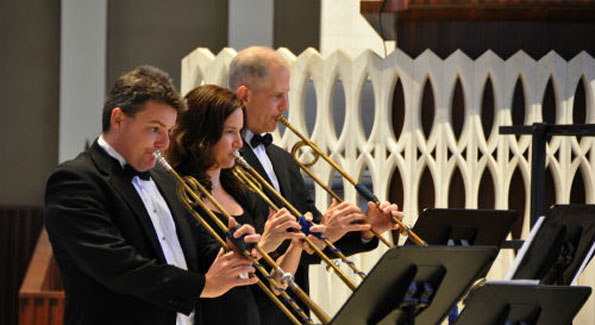Review: Washington Bach Consort celebrates 35th anniversary with regal performance.
In 1977 when J. Reilly Lewis began the Washington Bach Consort, his passion for the masterful composer Johann Sebastian Bach was nurtured by a cadre of loyal supporters. That was most evident as the faithful audience filled National Presbyterian Church for the opening concert of the 35th anniversary season just a few weeks ago. One of its most ardent supporters was Bee Stelloh, in whose memory the concert was presented.

The baroque trumpets played by Nathaniel Mayfield, Joelle Glaser Monroe and Josh Cohen were an essential element to the regal majesty of the music. (Photo by Beth Lewis)
Themed “Kings and Commoners,” Lewis conducted the consort in a range of celebratory works by Bach, Handel, John Blow, Orlando Gibbons and William Boyce. Just as in present times, much fanfare surrounds a political election. In Bach’s day, music of great grandeur heralded the rise of a great leader. That sentiment was summoned forth in Boyce’s “The King Shall Rejoice.” Reminiscent of Handel’s writing style, the text of the work was often reinforced by a musical idea. Notable was the appearance of the trumpets on the phrase “and shall a crown upon his head,” evoking quite an image. The brass and percussion definitely played an integral part in the chosen repertoire.
Following the intermission, the consort began with Handel’s “My Heart is Inditing.”
Bach’s cantata Preise, Jerusalem, den Herrn, BWV119 immediately gave a sense of majesty to the carefully themed program. The tenor Joseph Gaines sang elegantly with a sense of stylistic finesse. His tone contained a wonderful variety of nuances, with the vibrato evenly placed. The projection of his vocal delivery was generous, negotiating the demands of the composer’s involved writing with graceful ease. Bass Jon Bruno brought a wonderful dark contrast with his fervent rendering of the accompanied recitative. At the portative organ, Todd Fickley along with William Simms (theorbo) and Patricia Neely (string bass) provided a solid continuo throughout.
Blow’s “God Spake” was more reflective, accompanied by Fickley at the organ. The arching rise of the upper voices were given ample foundation by the solid bass section.
The “Te Deum” by Orlando Gibbons revealed some wonderful solo voices, but lacked a sense of cohesion among the soloists. In particular, the voices seemed to come from a variety of directions, as opposed to having all of the soloists in direct proximity with each other. Still, glowing moments emerged, especially with the lovely singing by countertenor Chris Dudley on “Vouchsafe, O Lord” and an unexpected delight in the voice of countertenor Roger Isaacs, who emerged in “Thou sittest at the right hand” with an impressive instrument.
One could not have planned a more glorious ending to a concert of such celebratory nature than Bach’s Cantata No. 69, Lobet Den Herrn, Meine Seele. Not only was the work a temple of masterful choral singing, but it is one of great virtuosity for the consort singers and players alike. “It is a masterpiece contraptually” Reilly said as he explained the structural makeup of the piece. Michelle Humphries’ rhythmic precision on the tympani added greatly to the music’s joyous pomp. Fiendishly difficult, the multiple musical themes tossed around the ensemble were like the ultimate musical stamp of approval of Bach’s genius.

J. Reilly Lewis listens as Geoffrey Burgess (left) shows the audience the oboe da caccia. (Photo by Beth Lewis)
Soprano Rebecca Kellerman Pertretta rendered her solo recitatives with an angelic presence as she stood well-poised from her place in the choir. In the solo aria “Meine Seele” sung by mezzo Kristen Dubenion-Smith, the listener basked in the luxuriant richness of her lower register, while marveling at the facility of her upper tessitura. Her ornaments were well placed throughout and never detracted from the essence of the solo line.
As she declared “Meine Seele” or “my soul,” the depth of her conviction and connection to the music came through. Jon Bruno sang the aria “Mein Erloser” with a firm, resonant bass. Geoffrey Burgess was consistently stellar, alternating between the oboe da caccia (“hunting oboe”) and baroque oboe. The final chorale “May You, O God, Be Thanked and Praised” was, in a sense, a choral blessing, with the voices and instruments raised in thanksgiving: celebrating the vision of a young commoner, now full grown into an ensemble of musical “kingly” presence.
Petersburg, Va. native Patrick D. McCoy received a B.M. in vocal performance from Virginia State University and an M.M. in church music from the Shenandoah Conservatory in Winchester, Va. He has contributed arts and culture pieces to CBS Washington, The Afro-American Newspaper and the newly published book, “In Spite of the Drawbacks” (Association of Black Women Historians), which includes his chapter on legendary soprano Leontyne Price. McCoy has interviewed some of the most acclaimed artists of our time, including Denyce Graves, Norman Scribner, Julian Wachner, Christine Brewer and Lawrence Brownlee. Listen to these interviews and others at Blog Talk Radio. McCoy may be reached via email at wlperformingarts@aol.com and on Twitter @PatrickDMcCoy.
